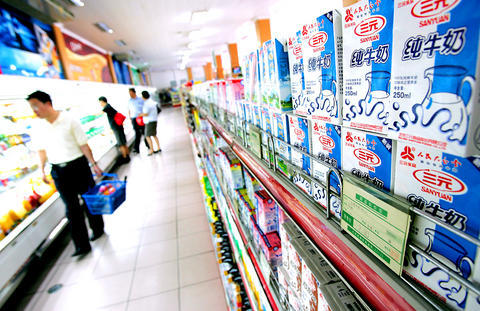Unlike oil, we probably won't ever run out of milk. But the two liquids have one thing in common: They're trading at record highs.
Milk prices are rising for reasons that include growing appetites for dairy foods in China and elsewhere in Asia, where chains such as McDonald's and Starbucks are introducing unfamiliar taste buds to cheeseburgers and lattes.
Also adding to the price are rising costs for animal feed, shrinking European stocks and droughts in Oceania, the world's largest milk exporting region.

PHOTO: AP
Paying more for milk, a source of nutrients like calcium, is causing uproar in Germany and other countries where many families consider providing children with an affordable glass of milk a fundamental right.
Prices are likely to remain high until dairy farmers add more cows or shift production to powders, more easily traded than the liquid stuff.
Milk prices in the US hit a record high last month, the US Department of Agriculture said. It forecast prices would remain high throughout the year.
International dairy product prices increased 46 percent between November last year and April this year, with milk powder prices increasing even faster, the UN Food and Agriculture Organization said.
Companies like candy giant Hershey Co that use dairy for their products are feeling the pinch. But in many parts of the globe, dairy farmers are cheering.
"Global demand has been extraordinary for American dairy products, but global supplies of dairy products have been exceptionally tight," said Michael Marsh, head of the Western United Dairyman trade group in California, the top dairy-producing US state. "From the American dairy farmers' perspective, you have almost a perfect storm."
In China, milk consumption has soared along with rising incomes, a massive expansion of the dairy industry, and the increasing taste for nonnative foods among young urbanites.
The Dairy Association of China estimates consumption will rise by 15 to 20 percent annually in coming years.
The boom in biofuels is also pushing up corn prices and, as a consequence, making animal feed more expensive. Farmers have responded by raising milk prices.
Corn futures indicate that the price of corn will remain high this year, according to the Washington-based International Dairy Foods Association. Prices have also risen for soybeans, another feed crop, the association said.
The impact on the price of a carton of milk differs across the globe because dairy markets vary significantly from region to region, skewed by domestic and trade policies and other factors such as geography.
Governments in US, Canada, the EU and Japan have a range of policies including tariffs and quotas which insulate their milk from international prices, the FAO said.
These systems are under strain, as high rewards in the globalized market are inspiring milk producers to challenge the old practices.
In Germany, where milk prices are set annually after negotiations between producers and powerful retailers such as Aldi, Lidli and Edeka, David took on Goliath -- and won.
Retailers have been holding prices down to the tune of almost 15 percent since 2002. Since July, they have been paying producers an extra 0.07 to 0.10 euros (US$0.05 to US$0.07) per liter after the producers threatened to take their milk elsewhere.
In a country where beer is still cheaper than milk, higher prices for dairy products have led to a flurry of condemnation.

Quanta Computer Inc (廣達) chairman Barry Lam (林百里) is expected to share his views about the artificial intelligence (AI) industry’s prospects during his speech at the company’s 37th anniversary ceremony, as AI servers have become a new growth engine for the equipment manufacturing service provider. Lam’s speech is much anticipated, as Quanta has risen as one of the world’s major AI server suppliers. The company reported a 30 percent year-on-year growth in consolidated revenue to NT$1.41 trillion (US$43.35 billion) last year, thanks to fast-growing demand for servers, especially those with AI capabilities. The company told investors in November last year that

Taiwanese suppliers to Taiwan Semiconductor Manufacturing Co. (TSMC, 台積電) are expected to follow the contract chipmaker’s step to invest in the US, but their relocation may be seven to eight years away, Minister of Economic Affairs J.W. Kuo (郭智輝) said yesterday. When asked by opposition Chinese Nationalist Party (KMT) Legislator Niu Hsu-ting (牛煦庭) in the legislature about growing concerns that TSMC’s huge investments in the US will prompt its suppliers to follow suit, Kuo said based on the chipmaker’s current limited production volume, it is unlikely to lead its supply chain to go there for now. “Unless TSMC completes its planned six

Intel Corp has named Tasha Chuang (莊蓓瑜) to lead Intel Taiwan in a bid to reinforce relations between the company and its Taiwanese partners. The appointment of Chuang as general manager for Intel Taiwan takes effect on Thursday, the firm said in a statement yesterday. Chuang is to lead her team in Taiwan to pursue product development and sales growth in an effort to reinforce the company’s ties with its partners and clients, Intel said. Chuang was previously in charge of managing Intel’s ties with leading Taiwanese PC brand Asustek Computer Inc (華碩), which included helping Asustek strengthen its global businesses, the company

TikTok abounds with viral videos accusing prestigious brands of secretly manufacturing luxury goods in China so they can be sold at cut prices. However, while these “revelations” are spurious, behind them lurks a well-oiled machine for selling counterfeit goods that is making the most of the confusion surrounding trade tariffs. Chinese content creators who portray themselves as workers or subcontractors in the luxury goods business claim that Beijing has lifted confidentiality clauses on local subcontractors as a way to respond to the huge hike in customs duties imposed on China by US President Donald Trump. They say this Chinese decision, of which Agence